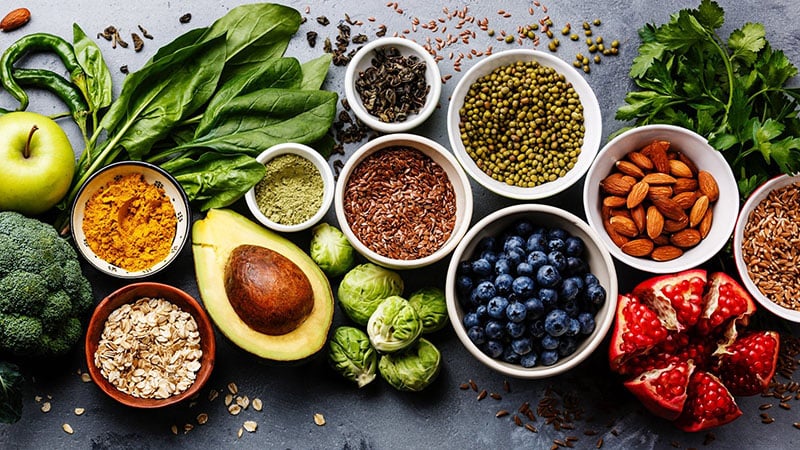Improper nutrition is considered one of the major risk factors leading to the rapid increase of non-communicable diseases.
Nutrition: The Key to Health
Improper nutrition is considered one of the main risk factors leading to the rapid increase of nutrition-related non-communicable diseases such as cardiovascular disease, diabetes, cancer, overweight - obesity, gout, and dyslipidemia.
 |
| Illustration |
To help people have a reasonable diet and ensure health, talking to reporters, Ms. Bui Thi Mai Huong, Institute of Nutrition, recommends that people need to follow 10 nutritional tips such as: Eat a variety of foods and ensure enough of the 4 groups of carbohydrates, protein, fat, vitamins and minerals;
Combine foods from animal and vegetable protein sources, should eat shrimp, crab, fish and beans. Eat a reasonable combination of vegetable oil and animal fat, should eat sesame and peanuts. Should use iodized salt, do not eat salty food. Need to eat vegetables and fruits every day.
Ensure food hygiene and safety in selecting, processing and preserving food. Drink enough clean water every day. Breastfeed your baby immediately after birth, exclusively breastfeed for the first 6 months, supplement with appropriate food and continue breastfeeding until 24 months.
Children over 6 months and adults should use milk and dairy products appropriate to their age. At the same time, increase physical activity, maintain a reasonable weight, do not smoke, limit alcohol, carbonated drinks and eating and drinking sweets.
According to expert Mai Huong, no single food can provide enough nutrients for the body's needs. Therefore, people need to combine eating many types of food and regularly change dishes to provide enough nutrients to meet the body's complex nutritional needs. Every day, each person needs to eat at least 15 types of food representing the 4 groups mentioned above.
Animal protein contains many essential amino acids that cannot be replaced in balanced proportions, so it has high biological value. Foods rich in animal protein include meat, eggs, fish, milk, shrimp, crab, frog and other aquatic products. Plant foods rich in protein such as beans often have little or no cholesterol.
Shrimp, crab, and fish are valuable sources of protein, containing all the necessary amino acids. Fish fat is rich in vitamins A and D; it also contains many essential unsaturated fatty acids and is low in cholesterol. Fish, especially sea fish, is rich in important minerals. You should eat 2-3 fish meals a week.
Fish oil is rich in vitamins A and D; it also contains many essential unsaturated fatty acids and is low in cholesterol. Fish, especially sea fish, is rich in important minerals. You should eat 2-3 meals of fish per week.
Combining vegetable fats (oil, sesame, peanuts) and animal fats (lard) helps balance nutrition in meals. Accordingly, sesame and peanuts are recommended foods rich in fat and protein, containing many unsaturated fatty acids such as oleic acid, linoleic acid, low in cholesterol and many B vitamins.
The body's salt requirement is only less than 5 grams per day, however, Vietnamese people are currently consuming more salt than necessary.
Experts from the Institute of Nutrition are concerned about this situation because eating salty foods can easily lead to high blood pressure, kidney disease, and can lead to risks such as stomach cancer, osteoporosis, or asthma.
Another advice according to Ms. Mai Huong, Iodine is very necessary for the body, especially to prevent goiter. Just using iodized salt in daily food preparation is enough to meet the body's iodine needs.
Some other recommendations are given such as people should drink fruit juice, vegetable juice, fresh tea, dry tea that is not too strong, water from guava leaves or buds. Limit carbonated drinks, soft drinks, alcohol, beer.
Increase physical activity, maintain a reasonable weight, do not smoke, limit alcohol, carbonated drinks and sweets to maintain a reasonable weight and limit illness.
Understanding processed foods
In addition to healthy nutrition advice, according to nutrition experts, processed foods are increasingly playing an important role in Vietnamese family meals. This will be a future consumption trend, so understanding and using this type of food properly is extremely important.
Ms. Mai Huong said that processed foods are part of a diverse diet and a consumption trend in modern society.
Processed foods provide a diverse source of food for consumers to promote economic development. At the same time, it increases the processing value of agricultural products, expands the consumer market and creates innovative products to meet the increasingly diverse needs of consumers.
According to experts, the processing also helps to improve nutritional value, convenience and safety for users. According to the trend, consumers today are increasingly concerned about the quality and safety of processed foods, especially in the context of urbanization and increasing personal income.
One of the main concerns is the content of preservatives and food additives, which requires consumers to be wise in choosing products from reputable manufacturers.
“Food safety issues are not only related to product quality but also reflect consumer confidence in law enforcement and food safety practices,” said a representative of the Institute of Nutrition.
The use of processed foods is an inevitable and increasing need of consumers to meet eating trends in busy modern life.
Therefore, the mission of the processed food industry is very important in creating healthy, convenient processed products for consumers. This requires reputable manufacturers with experience and vision in food production technology.
Talking about the trend of consuming processed foods, Mr. Pham The Quyen, Director of Product Research and Development, TH Group , when using this type of food, people are most concerned about the source of raw materials and the processing process to ensure safety.
Therefore, to gain the trust of customers, businesses must be strict in selecting and controlling the origin of input materials.
Specifically, raw materials must be strictly selected according to a set of standards, from leading suppliers, with easy traceability, quality assurance, natural, clean and fresh, meeting food hygiene and safety standards, good for consumers' health.
Speaking specifically about TH, according to Mr. Quyen, all product formulas are researched and developed in the direction of using natural ingredients, without using preservatives, ensuring the criteria of "good for health".
The natural raw materials mentioned by Mr. Quyen include agricultural products and foods to produce product lines that all have clear origins and are carefully selected with strict purchasing standards and regulations, ensuring to meet the market's demand for high-quality, clean, healthy processed food products, bringing sophisticated culinary experiences to users.
"The application of modern technological lines in the production process not only helps preserve the freshness and natural nutrition of the product but also creates a harmonious flavor characteristic of each dish. The product has diverse nutrition from many types of ingredients such as meat, shrimp, vegetables...", TH Group representative added.
Source: https://baodautu.vn/loi-khuyen-dinh-duong-lanh-manh-tu-chuyen-gia-d220746.html




![[Photo] National conference to disseminate and implement Resolution No. 66-NQ/TW and Resolution No. 68-NQ/TW of the Politburo](https://vphoto.vietnam.vn/thumb/1200x675/vietnam/resource/IMAGE/2025/5/18/adf666b9303a4213998b395b05234b6a)


![[Photo] General Secretary To Lam visits exhibition of achievements in private economic development](https://vphoto.vietnam.vn/thumb/1200x675/vietnam/resource/IMAGE/2025/5/18/1809dc545f214a86911fe2d2d0fde2e8)




























































































Comment (0)